Detroit Axle vs Moog Parts: Thorough Comparison
Stylethority is reader-supported. When you buy through links on the site, we may earn a commission.
If I had a penny for every time people asked me about these two brands…Well, I wouldn’t be rich. However, I’d be able to buy a decent dinner, inflation included.
So, Detroit Axle vs Moog. How do these two compare to each other? I know some of you might be busy and this will be a longer article.
If you don’t want to read everything, here’s a quick summary:
➥➥ MOOG: Being the older brand, Moog has a way more diverse range of vehicle applications. Basically, whatever your vehicle is, Moog will have aftermarket parts for it.
Surprisingly to some, the basic Moog products (ball joints, wheel bearings) are equivalent to Detroit Axle.
The big difference comes with Moog’s premium Problem Solver car parts. These not only come with a lifetime warranty; they also feature durable reinforced construction.
In this sense, I’d recommend any Problem Solver ball joints or control arms as the superior choice:
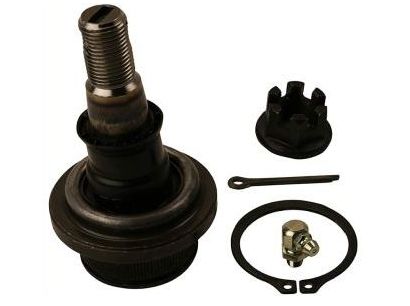
Part of the Problem Solver series. More durable powder-coated metal, also has a dust boot shield to protect it from dirt or water. A sturdy, serviceable and long-lasting ball joint.
| Product | Image | ||
|---|---|---|---|
|
Best Control Arms
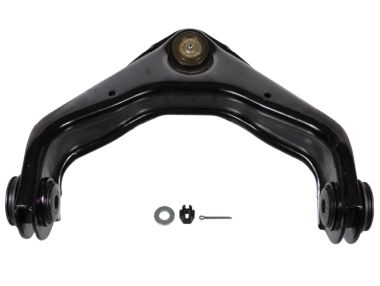
|
MOOG Problem Solver (KS)
|
Check Prices & Fit |
➥➥ DETROIT AXLE ➥➥
Detroit Axle has a lot of aftermarket parts for Chevy/GMC or Ford trucks. For many other vehicles, however, the lineup is rather limited.
Where Detroit Axle excels is convenience. With Moog, you have to pick your parts one by one. In comparison, Detroit Axle features full kits like this suspension bundle.
You get everything in one place without the need to compare serial numbers and fittings. On most of its parts, the brand also gives a 10-year warranty.
Cheap as they are, Detroit Axle aftermarket parts are still a decent choice if it’s ball joints or wheel bearings. For tie rod ends or control arms, I recommend you to go MOOG.
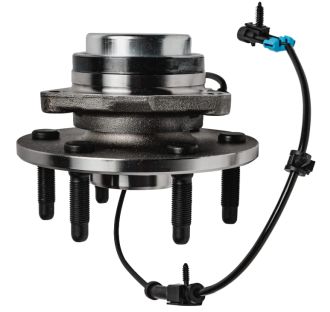
Affordable, well-manufactured wheel bearing. OEM-fit and sturdy components. Features a fantastic 10-year warranty.
| Product | Image | ||
|---|---|---|---|
|
Best for value kits
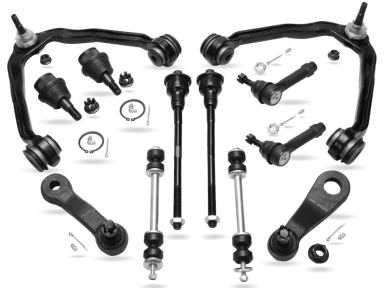
|
Detroit Axle Bundle
|
Check Prices & Fit |
A note on warranty terms
Suspension parts might look cheap if you need a ball joint or two. Full setups, however, can cost quite a bit – so it’s natural to look at the warranty.
Moog has the more complicated warranty terms because the brand divides its products into two lineups. You have the ‘standard’ Moog and then you have the ‘Problem Solver’ series I discussed.
On the Problem Solver, you have a lifetime warranty.
How to tell which ones are ‘Problem Solvers’? For control arms, just look at the CK lettering in front of the part number (see example). For ball joints, the lettering is K (see example).
On any standard Moog product, you get a 3-year or 36000-mile warranty, whichever comes first.
Detroit Axle offers a 10-year warranty on its suspension car parts. It sounds good on paper, but the warranty also has a lot of limitations (US-only, no off-roading, etc.) You can check the full terms here.
Detroit Axle vs Moog ball joints
As I discussed earlier, the standard Moog ball joints are pretty much equivalent to what Detroit Axle offers.
The biggest difference between them would be the fact that Moog supports way more vehicle applications.
However, Moog’s Problem Solver ball joints vastly exceed what Detroit Axle offers. Here are a few reasons why:
- Improved powder-coated metal for enhanced durability and resistance to extreme stressors.
- Dust boot shield to protect from dirt, gravel, or water contamination.
- Advanced heat treatment to minimize the risk of premature failure.
Here’s how these parts are constructed:
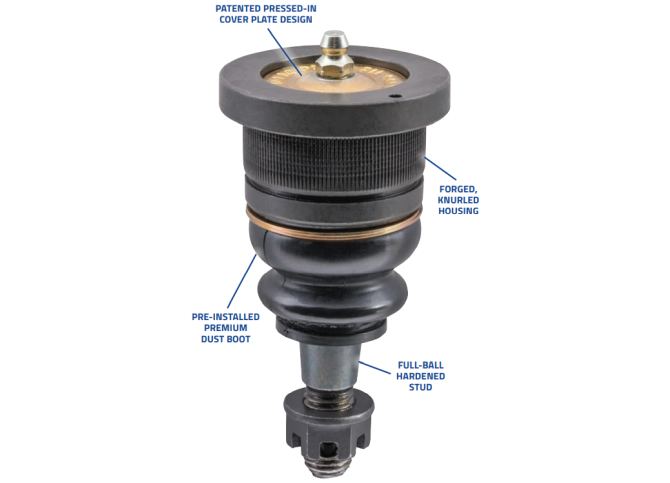
Remember, the Problem Solver ball joints are the most ones starting with the letter ‘K’.
Here’s a quick comparison between Moog and Detroit Axle in this regard:

Part of the Problem Solver series. More durable powder-coated metal, also has a dust boot shield to protect it from dirt or water. A sturdy, serviceable and long-lasting ball joint.
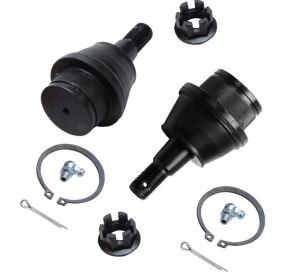
A cheaper ball joint alternative. Decent construction comparable to standard MOOG; vastly inferior to the Problem Solver series' durability and stress-resistance.
Moog vs Detroit Axle wheel bearings
Things here get trickier, maybe because I’ll go against the grain and say that both brands are pretty much identical.
What I’ve seen in Moog is an improved wheel stud bolt coating. Obviously, this makes things more resilient, but it’s not a groundbreaking difference from what Detroit Axle has. The ABS cord in applicable bearings is also reinforced and abrasion-resistant.
The biggest issue with Detroit Axle is them not writing more about their wheel bearings.
You get the ‘precision-designed’ and ‘top quality seal design’, but the brand doesn’t fully explain how this part is manufactured.
In comparison, Moog has extensive graphics and explanations:
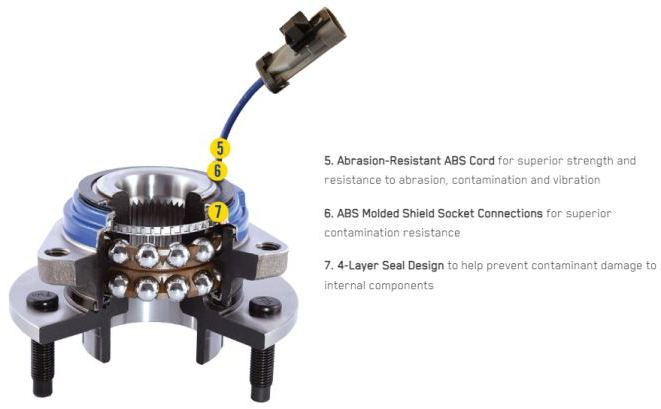
As I said, though, this is a matter of branding. In most comparable applications, both work fine.
A factor that matters for many is the different warranties.
Moog doesn’t have Problem Solver wheel bearings, so you’re stuck with a 3-year/36000-mile warranty. Detroit Axle has a better offer with its 10-year warranty.

Affordable, well-manufactured wheel bearing. OEM-fit and sturdy components. Features a fantastic 10-year warranty.
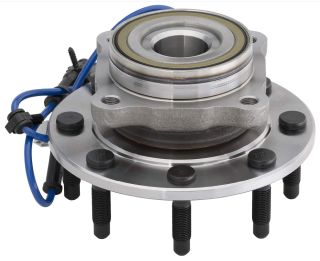
An equally popular option that features sturdier ABS-cord and better coating on the wheel stud bolts. Shorter 3-year/36k mile warranty, however.
Control arms:
The definite Moog winner
We’re entering Moog territory here. While ball joints and wheel bearings are more contested, Detroit Axle drastically falls behind when it comes to control arms.
Even the standard control arms from Moog exceed its competitor when it comes to ease of installation, greasability, and the durability of the full ball metal stud.
Things get even harsher for Detroit Axle when you get the CK-lettering Problem Solver:
- Carbon fiber-infused bearings vastly outperform any other control arm option. Tough as nails and eliminates any socket friction.
- Improved bushings – calibrated with just the right amount if stiffness for quiet operation.
- Extra coating to take care of corrosion, rust, or any other contaminants.
These are only three of the Problem Solver improvements, but I’d say they’re the most important ones. For the price category, the Moog control arms are unrivaled and I’d recommend you go for them.
| Product | Image | ||
|---|---|---|---|
|
Massive Improvement

|
MOOG KS Control Arms
|
Check Prices & Fit |
Tie rod ends & idler arms:
A different approach
This one’s a more peculiar difference between Detroit Axle and Moog.
Take tie rod ends, for example. You can see a lot of standalone Moog tie rod ends (see example). On the contrary, though, Detroit Axle always includes its tie rod ends in full suspension bundles like this one.
In other words, if you’re looking to buy car parts online and need a tie rod end, more often than not you’d be forced to go Moog.
(In all fairness: both are comparable in terms of this particular part, way above penny-pinchers like Quick Steer).
With idler arms or pitman arms, Detroit Axle does feature standalone replacements. However, I’d generally advise you to go Moog for one specific reason:
In many vehicles, OEM idler arms are more prone to wear and tear compared to Moog’s slightly improved product design.
Detroit Axle pretty much copies the OE product design, so Moog’s products are simply more long-lasting and durable. Not to mention that you have heavy-duty pitman arms like this one which further exceed any alternative.
| Product | Image | ||
|---|---|---|---|
|
Better single part
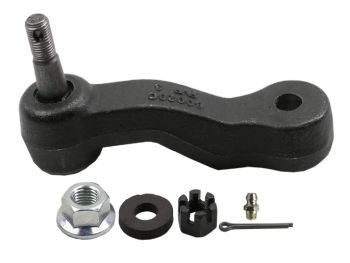
|
MOOG K6534 Idler arm
|
Check Prices & Fit |
That said, if you’re looking for a full suspension kit, Detroit Axle features both convenience and decent performance for its price.
Not everyone wants to search parts one by one, and DA’s bundles always include all the pitman arms, tie rod ends, and other much-needed components. This is comparable to the TRQ bundles, but DA still features way more kits/vehicle applications than this particular competitor.
In a way, it’s a bargain for the not-so-picky drivers in lighter road conditions:
| Product | Image | ||
|---|---|---|---|
|
Best for value kits

|
Detroit Axle Bundle
|
Check Prices & Fit |
Where are Moog and Detroit Axle parts made?
When it comes to aftermarket parts, this is a staple question.
So, let’s start with Detroit Axle.
Historically, the company re-branded from Dearborne Axle (their old name). In Dearborne times, the brand manufactured its own axles, rack & pinions. Supposedly, this is the case right now too.
However, most of their suspension parts are made in China. Here’s a Blazerforum thread where this gets confirmed by Detroit Axle staff correspondence.
A lot of aftermarket brands – TRQ for example, circle around the made-in-China debate by saying their parts are assembled in the US.
I’m not sure whether Detroit Axle does this too, but the core manufacture is still outsourced to China anyways.
What about Moog, then?
Moog is a bit more complicated. Keep in mind this is a 100-year-old company we’re talking about, so they’ve shifted their manufacture around quite a bit.
Generally, Moog applies a spread-out-manufacture strategy. This means that yes, some parts of theirs are produced in China. But they also have facilities in Mexico, Turkey, India, and even Japan.
It’s very hard to trace which parts come from where; I’d assume that with the Problem Solver series you’re getting more upscale Taiwanese manufacture or they’re made in Taiwan/Japan or Mexico.
For the standard, Detroit Axle-equivalent series I’d wager they rely on Chinese factories.
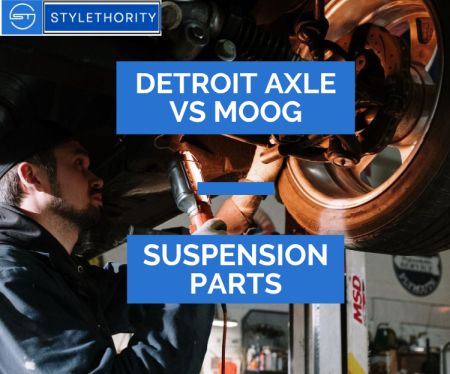
Summary:
Are Detroit Axle parts good? Is Moog better?
This was an extensive review of the two brands’ suspension parts and hopefully, you saw that the answer to these questions isn’t straightforward.
For the standard wheel bearings or ball joints, I discussed beforehand…I’d say yes, Detroit Axle is a decent choice for entry-level replacement parts. Especially for American vehicles.
(For strictly foreign cars, you can also consider Beck/Arnley, an underrated brand.)
In other suspension components such as tie rod ends or control arms, however, Moog is vastly superior. Generally, any time you see a Moog Problem Solver, you know you’re getting something better than Detroit Axle.
Last but not least, remember what I additionally pointed out. Detroit Axle has plenty of suspension options for Chevy/GMC trucks or even Ford vehicles. Moog, however, builds upon the usual US-made heavy trucks inventory and extends its products to a more diverse lineup.
On the topic of suspension, I haven’t discussed shocks/struts here.
Moog lacks any meaningful replacement in this segment, but I find Detroit Axle a nice option for the budget-minded owner of sedans like Lexus.
- Woolx vs Smartwool: Discussing Some Details - October 4, 2023
- Best Struts For Honda Accord & Element: What Works - September 22, 2023
- Bilstein vs Monroe Shocks: My Opinion On What Works Best - September 19, 2023


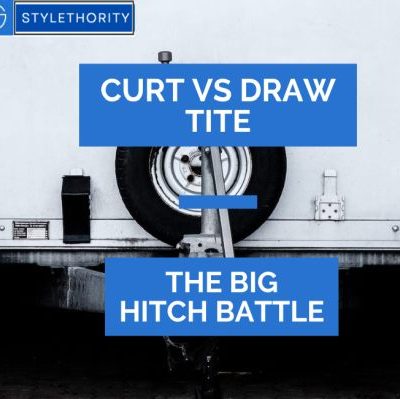
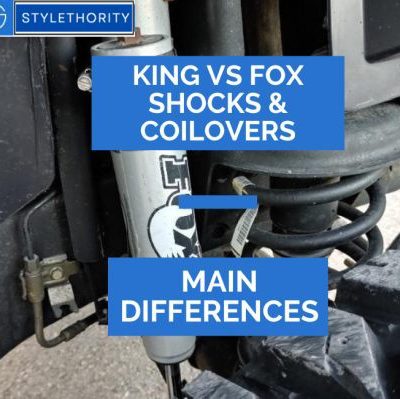
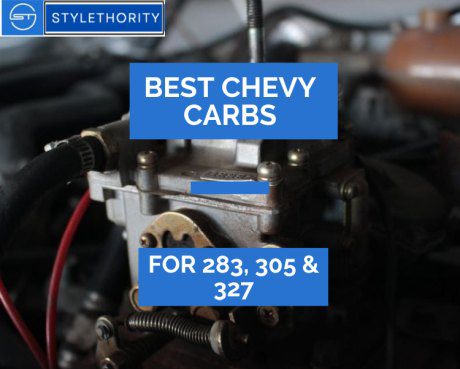
Detroit axle is the cheapest quality parts you can by they won’t last a year even when they say 10 year warranty! Then they give you a run around when it comes to backing their product stick with Moog and you wont have to do it twice!
Stick to actual, made-in-the-USa Detroit Axle drive shafts.
ymmv on about all of the rest of it.